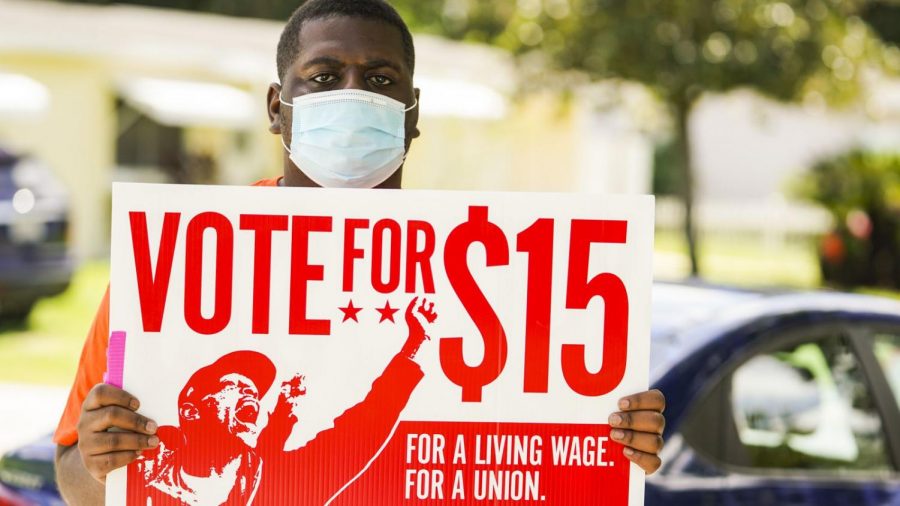Florida Voters To Raise the States Minimum Wage to $15 Per Hour
An advocate for increasing the minimum wage to $15
November 7, 2020
Florida voters approved the minimum wage ballot initiative, Amendment 2, which aims to raise the mandatory minimum wage to $15 over the next few years. This change will be in full effect by 2026. Florida has become the eighth state to approve a minimum wage of $15 per hour and the first to do so via ballot measure.
The eventual $15 minimum wage will be a huge increase from the current $8.56 per hour minimum wage in Florida. Amendment 2 seeks to raise the minimum wage to $10 per hour effective September 30th, 2021. Then, the minimum wage will increase annually by $1.00 per hour until the minimum wage reaches $15 per hour in 2026. After that, the minimum wage will revert back to being adjusted annually by inflation, according to the Associative Press.
According to the Associated Press, the initiative was approved by just over 60% of Florida voters. Although there is overwhelming support for Amendment 2, there is also an ongoing debate whether the consequence of raising the minimum wage could cause more harm than good. Critics of the amendment believe that raising the wage will increase prices and cause people to lose their jobs, especially amid a pandemic that has already caused the unemployment rate to skyrocket.
The Florida Restaurant and Lodging Association (FRLA), a non-profit hospitality trade company, opposes the amendment, calling it “drastic.” According to FRLA, the $15 minimum wage increase will be “devastating to the hospitality industry, which is critical in the Sunshine State.” In a news release, FRLA also claimed that “With such an exorbitant hike in payroll costs, this ballot amendment will force small businesses that are already struggling to close, destroying local economies and killing additional jobs.”
However, several studies refute these concerns, claiming that raising the minimum wage will have positive outcomes. One being a nursing home study by economist Krista Ruffini, a visiting scholar at the Minnesota Federal Reserve. Although it is still a working paper, the New York Times believes that the evidence still deserves consideration, seeing that it is relevant to the current minimum wage debate as well as our current COVID-19 pandemic. In the study, Ruffini explores “the relationship between minimum wages and the quality of services provided by low-wage workers by examining safety inspections and patient health outcomes in nursing homes following minimum wage reforms,” according to the Washington Center for Equitable Growth.
In her study, Ruffini found that “a ten percent increase in the minimum wage would prevent at least 15,000 deaths [in nursing homes each year], lower the number of inspection violations by one to two percent, and reduce the cost of preventable care,” as summarized in the abstract of her study. Furthermore, “firms are able to fully offset higher labor costs by attracting patients with a greater ability to pay and increasing prices for these residents, resulting in no significant change in profitability.” Due to the rise in wages, less employees left and patients benefited from the continuity of their caregivers.
States that have approved an eventual minimum wage of $15 are California, Connecticut, Illinois, Maryland, Massachusetts, New Jersey, New York, and now Florida.


